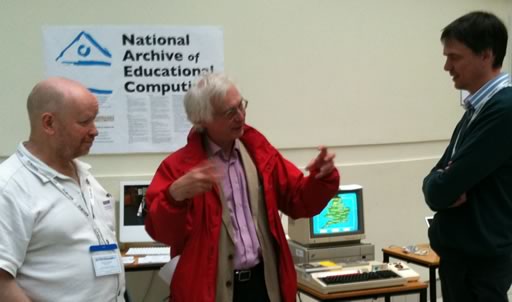CAL '11
| When |
Apr 12, 2011
to
Apr 15, 2011 |
|---|---|
| Where | Manchester |
This was the paper proposal:
Ultraversity - the impact of online work-focussed learning on the lives of students three years after graduation
Abstract
The Ultraversity project was initiated by the learning technology research centre, Ultralab, based at Anglia Ruskin University, in 2003. It set out to develop a degree course to meet the needs of prospective students ‘for whom university did not fit’. Such prospective students’ concerns were hpothesised to range from difficulties with attendance at the place & time the university offered study, the duration of part-time attendance, the relevance of topics studied and the approach to learning and assessment. The Ultraversity design addressed these and other concerns. In 2006, 144 students graduated, having spent three years studying full-time while employed. The focus of their study was action for improvement in their own work.
In 2006 an exit survey was conducted to discover student attitudes and plans. In September 2009, three years after graduation, a further survey of these graduates was conducted to discover the nature of the impact on themselves, their families and their careers. The survey invited closed and open responses on a range of issues related to their history, expectations and outcomes. These included the facts about their position, their motivation, their judgements on effectiveness, impact on their life, change in job role since starting the degree, their judgement on the cause of such change, changes in practice, change in their workplace and their final observations / story.
25 students completed the 2009 survey. These respondents represented the cohort reasonably well in terms of age profile, geographical spread and gender. Although there are concerns that some of the respondents are ‘enthusiasts’, nevertheless a rounded set of views, both positive and negative, were reported.
The closed responses were analysed to prepare statistical reports of the responses and the open responses reviewed to identify themes and stories which cast light on participant’s experience. Some data from the 2006 survey was correlated with the 2009 survey.
The outcomes suggest that the degree award (like most high-level qualifications) realised the participants’ potential to perform at a high level, advanced their career prospects but in some cases disrupted family life. The experience for many is reported as transformational.
A short paper of the findings presented mainly in graphical form, together with one published in 2007, ‘Ultraversity Model for Work-Based Learning’, will be presented as a basis for dialogue with other researchers attending the conference, with the following questions to stimulate debate:
1. What are the moral issues related to the impact of online, work-focussed learning on student’s lives?
2. What lessons for other innovators are there?
3. Which of these outcomes are connected to this particular innovation and which can be explained by other factors?
References
Millwood, R., Powell, S., Tindal, I. (2007) Undergraduate Student Researchers – the Ultraversity Model for Work-Based Learning. Proceedings of the 2nd TENCompetence Open Workshop - Service Oriented Approaches and Lifelong Competence Development Infrastructures, pp. 157-166. UoB: Bolton.
Millwood, R., Powell, S., Tindal, I. (2008) Personalised Learning and the Ultraversity Experience. Interactive Learning Environments, Volume 16, Issue 1, pp. 63 - 81. Routledge.
Powell, S., Tindal, I., 2009. The Undergraduate Student as Action Researcher. University Vocational Awards Council Annual Conference, Higher Education – Skills in the Workplace: delivering employer-led higher level wok-based learning. York, England 13-14 November, 2008. University Vocational Awards Council: Bolton.
This was the workshop proposal:
The National Archive of Educational Computing
Abstract
The development of educational computing in the UK began at the moment it was realised that the computer offered a context for learning, and pioneers were exploring its educational use from as early as 1963 (Excell, 1993). Over the years this has resulted in the creation of a wealth of knowledge, experience and artefacts, based largely on investment from the government.
Starting in the early nineties, Ultralab, the learning technology research centre (Millwood, 2006), gathered a large collection of software, hardware and documents. Since Ultralab closed in 2006 this material has been in the care of Core Education UK (Millwood, 2009a) and is being developed to become the National Archive of Educational Computing (Millwood, 2009b). Many other individuals have also saved important material and would like to inform future generations by donating it to a secure and sustainable archive.
The aim of the National Archive of Educational Computing is to look at these materials and to represent them as an accessible and substantially complete collection of one nation’s pioneering and world-renowned innovation. No existing archive, library or museum has an adequate representation of this material and more importantly, very little in the way of narrative, interpretation or analysis is available to the interested public, the education professional or the policymaker. The fear is that in the headlong rush of technological development, the UK has forgotten earlier lessons that may inform its future decisions.
References
Excell, P. (1993). ‘A Pioneer Initiative in School Computing’ in RESURRECTION - The Bulletin of the Computer Conservation Society (N. Enticknap, Editor) Retrieved February 5, 2009 from: http://www.cs.man.ac.uk/CCS/res/res06.htm#h
Millwood, R. (2009a). Core Education UK home page. Retrieved 5 February 2009 from Core Education UK: http://www.core-ed.org.uk
Millwood, R. (2009b). National Archive of Educational Computing home page. Retrieved 5 February 2009 from National Archive of Educational Computing: http://www.naec.org.uk/
Millwood, R. (2006,). Ultralab home page. Retrieved 5 February 2009 from Ultralab: http://www.naec.org.uk/ultralab/ww3
The Workshop Activity
The activity of the workshop will be to identify gaps in the timeline developed for the archive through analysis, discussion and evaluation from participants using their own memory as a guide. In addition a brainstorm to generate key lessons learnt based on a revised timeline overview will support the archive to focus activity in the years to come. Artefacts including papers, software and hardware from the archive will be available to stimulate memory and provoke discussion
(Words: 1155 )



